【2015中考复习方案】(译林牛津版·全国)2015届九年级英语复习课件(自学反馈+重点突破):第2课时 Units 5—8 [七年级上册](共59张PPT)
文档属性
| 名称 | 【2015中考复习方案】(译林牛津版·全国)2015届九年级英语复习课件(自学反馈+重点突破):第2课时 Units 5—8 [七年级上册](共59张PPT) | 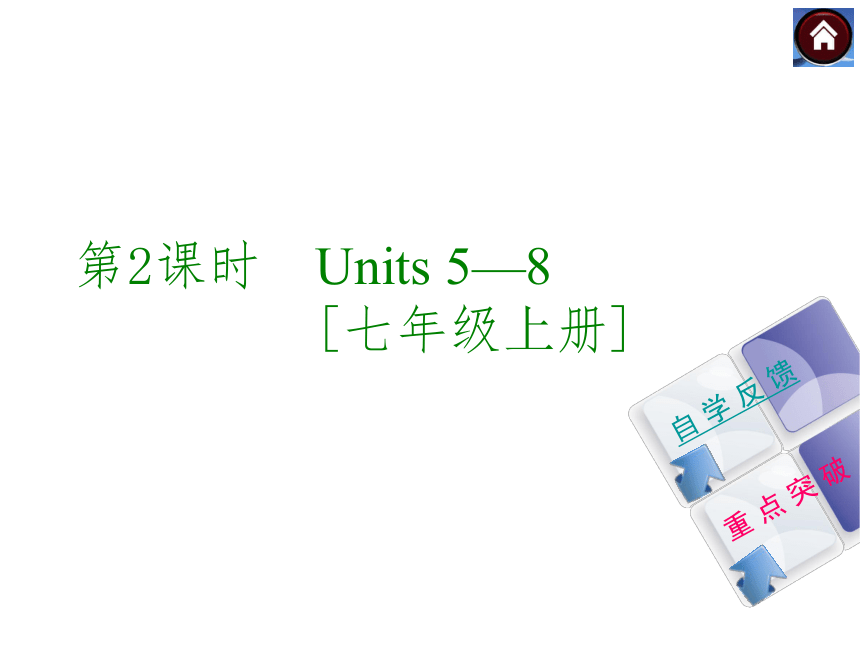 | |
| 格式 | zip | ||
| 文件大小 | 822.1KB | ||
| 资源类型 | 教案 | ||
| 版本资源 | 牛津译林版 | ||
| 科目 | 英语 | ||
| 更新时间 | 2015-01-17 19:54:47 | ||
图片预览

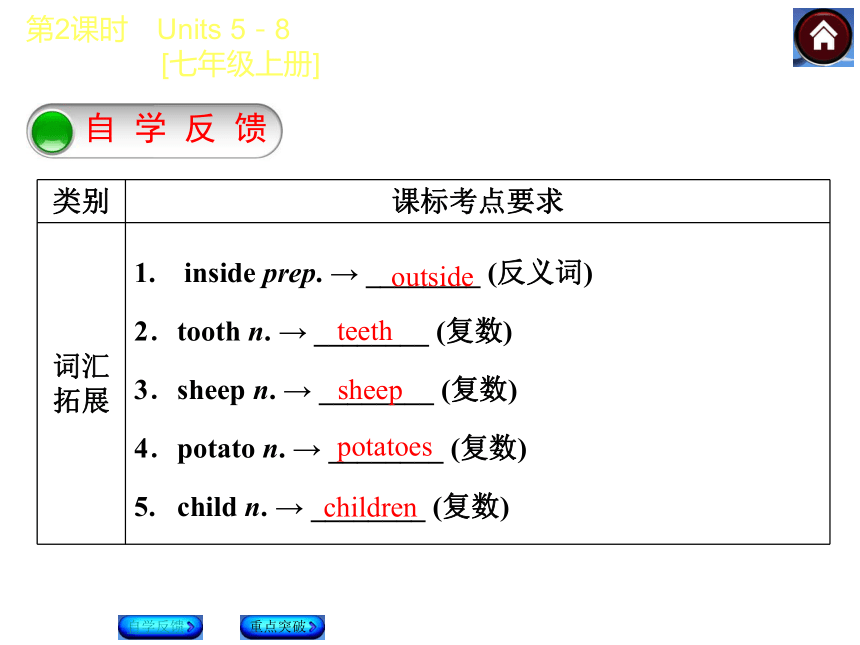
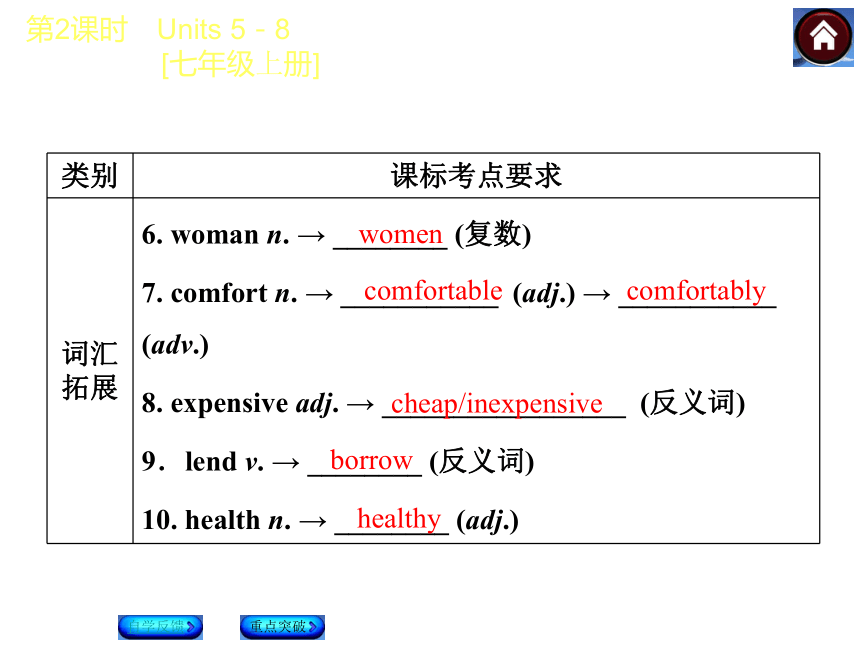

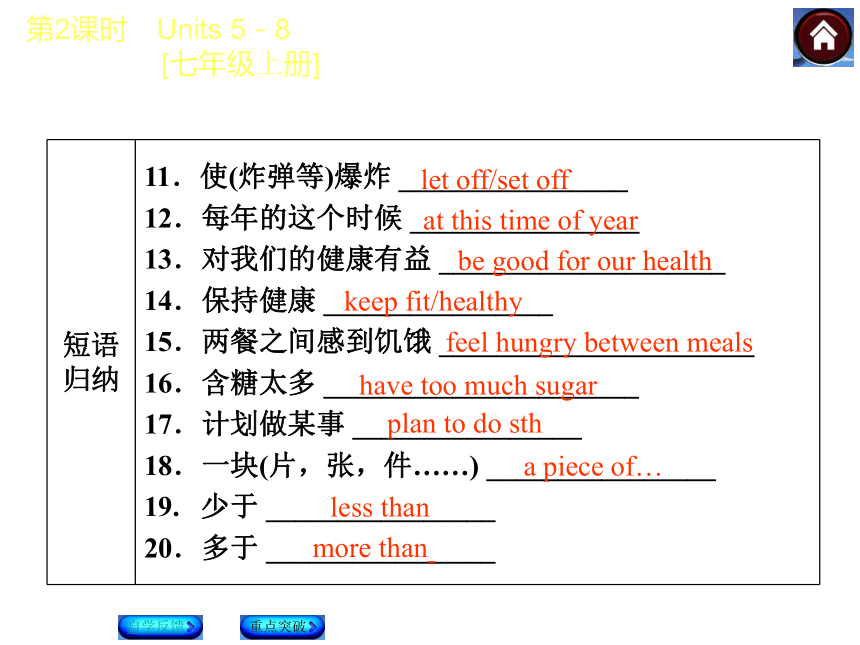

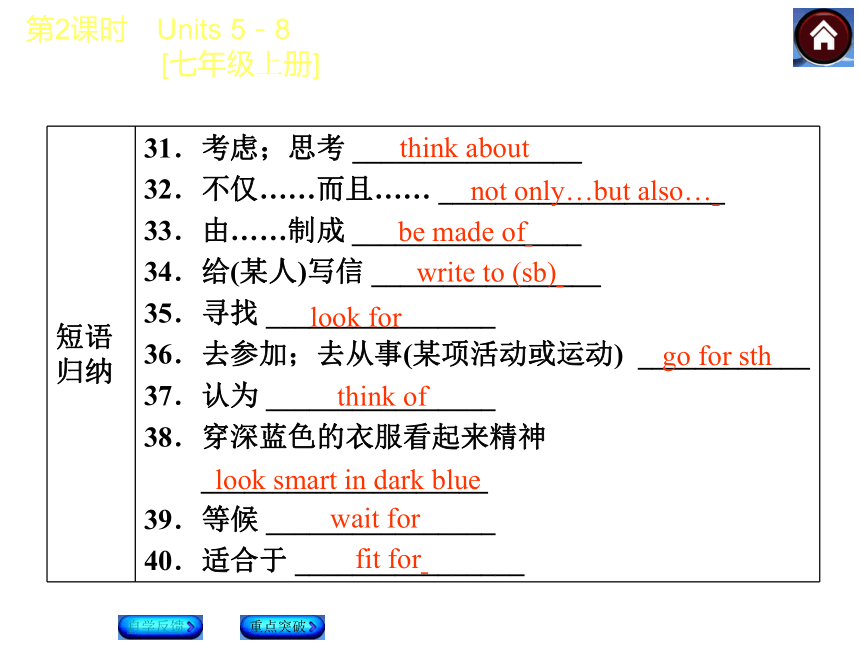
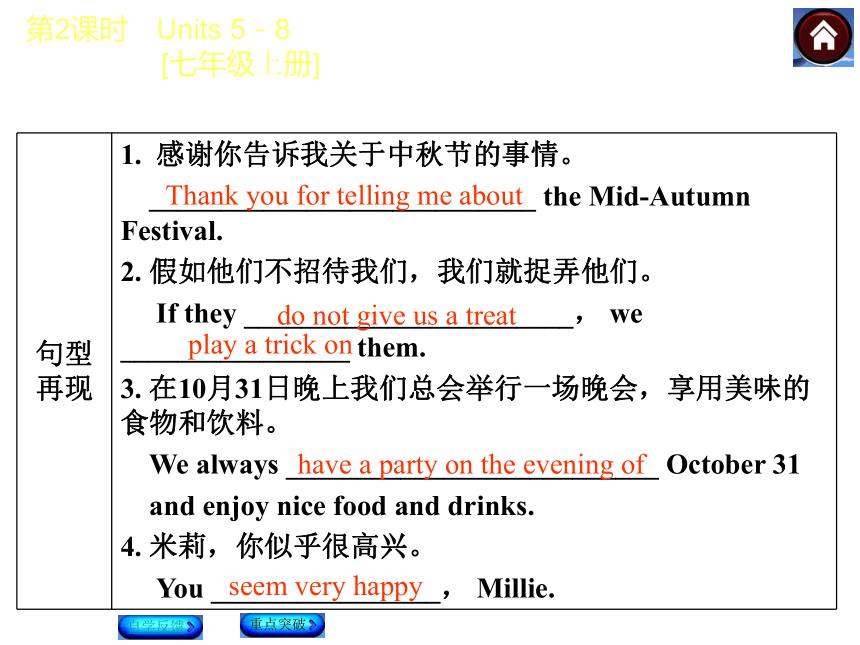

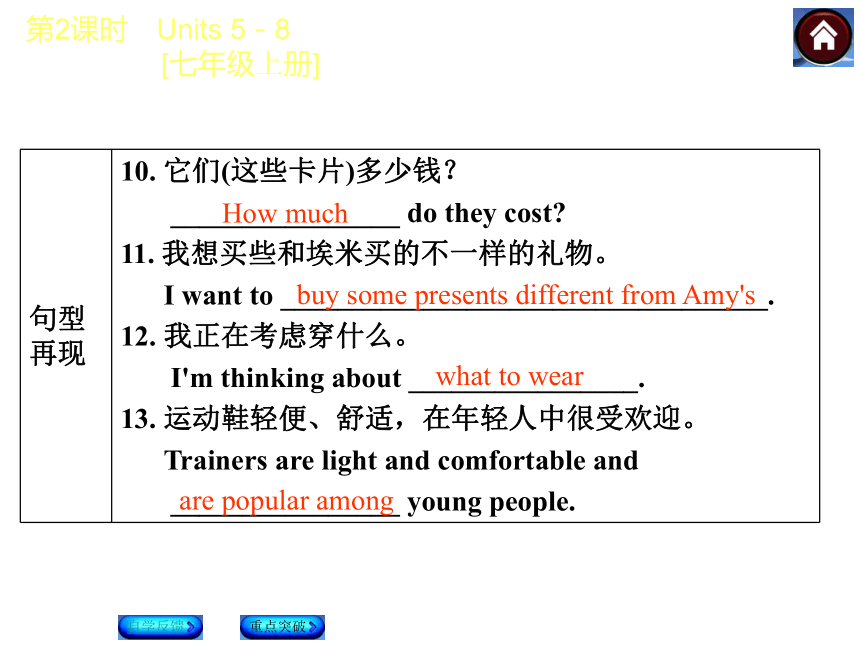
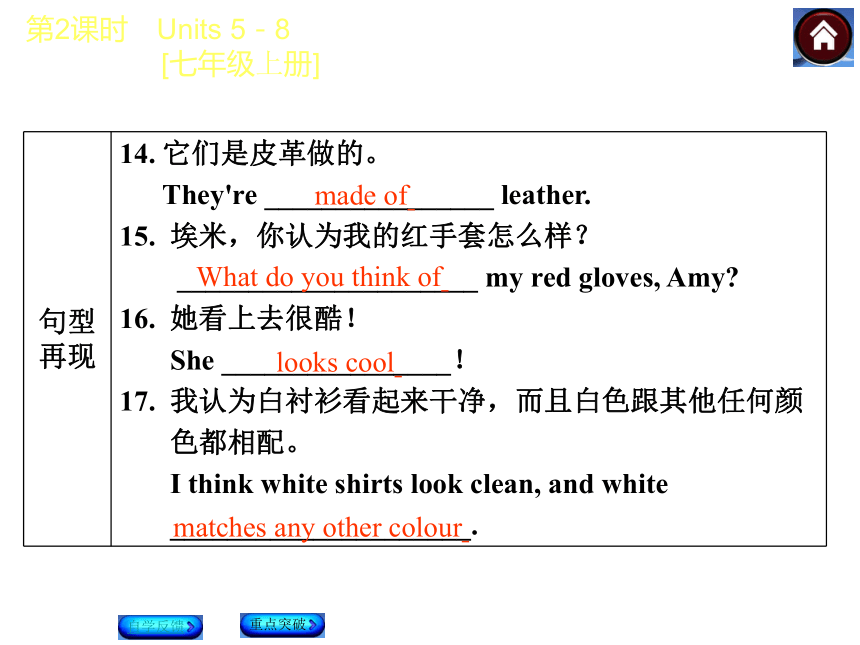

文档简介
课件59张PPT。第2课时 Units 5—8
[七年级上册]自 学 反 馈重 点 突 破第2课时 Units 5-8
[七年级上册]自 学 反 馈 sheep teeth potatoes children outside 重点突破自学反馈women comfortable cheap/inexpensive comfortably healthy borrow 第2课时 Units 5-8
[七年级上册]自学反馈重点突破第2课时 Units 5-8
[七年级上册]重点突破dress up get togetherknock on the door play a trick on sb give sb some candy as a treat be on holiday take photos find out at night on the evening of October 31 自学反馈let off/set off at this time of year be good for our health keep fit/healthy feel hungry between meals 第2课时 Units 5-8
[七年级上册]重点突破have too much sugar plan to do sth a piece of… less than more than 自学反馈take a walk need to exercise more be interested in you're welcome just a minute 第2课时 Units 5-8
[七年级上册]重点突破take a look buy sb sth/buy sth for sb be different from a pair of try on 自学反馈think about not only…but also… be made of write to (sb) look for 第2课时 Units 5-8
[七年级上册]重点突破go for sth think of look smart in dark blue wait for fit for 自学反馈Thank you for telling me about do not give us a treatplay a trick onhave a party on the evening of seem very happy 重点突破第2课时 Units 5-8
[七年级上册]自学反馈too much are bad for my teeth How often How long do you sleep I need you to carry 重点突破第2课时 Units 5-8
[七年级上册]There are different kinds of 自学反馈How much buy some presents different from Amy's what to wear 重点突破第2课时 Units 5-8
[七年级上册]are popular among 自学反馈made of What do you think of looks cool matches any other colour 重点突破第2课时 Units 5-8
[七年级上册]自学反馈重点突破第2课时 Units 5-8
[七年级上册]自学反馈词 汇 点 睛●1 dress v. 给……穿衣服 n. 服装;连衣裙重 点 突 破重点突破第2课时 Units 5-8
[七年级上册][搭配] dress up as… 装扮成……
dress oneself 自己穿衣服
dress sb (in…) 给某人穿衣服
be dressed in 穿着……
Dress yourself quickly. 你快点穿衣服。自学反馈
●2 plan vi.&vt.& n. 计划,打算
[点拨] plan 用作动词时,其现在分词、过去式和过去分词需双写“n”再加 “-ing” 或 “-ed”, 即: planning; planned; planned。
[搭配] plan to do sth 计划做某事
make a plan for this term 为本学期制定一个计划 重点突破第2课时 Units 5-8
[七年级上册]自学反馈●3 be made of 由……制成(可以看出原材料)
[拓展] be made from 由……制成(看不出原材料)
be made out of 由……制成
be made in+地点 在某地制造
be made into 被制成……
be made by sb 由某人制造重点突破第2课时 Units 5-8
[七年级上册]自学反馈
●4 keep v. 保持;使保持某种状态
[点拨] (1)“keep+形容词”意为 “保持某种状态”。
(2)“keep sb/sth+形容词”意为 “让某人/某物保持某种状态”。
(3)“keep sb/sth+表示地点的介词短语”意为 “让某人/某物一直在某地”。
(4)keep doing sth 意为“一直做某事”。
(5)keep sb/sth doing sth 意为 “让某人/某物一直做某事”。重点突破第2课时 Units 5-8
[七年级上册]自学反馈(6)keep sb/sth from doing sth 意为“阻止某人/某物做某事”, 相当于stop/prevent sb/sth (from) doing sth。
You must keep him in the room until he gets well. 你必须让他待在房间里直到他病好了为止。
They kept the machine working every day.
他们让这台机器每天不停地运转。
Forests can keep water from running away.
森林能够防止水分流失。重点突破第2课时 Units 5-8
[七年级上册]自学反馈●5 most adj.(many, much的最高级)最多的;多数的, 大部分的 adv.(构成最高级)最, 最多;非常, 极 n. 大多数, 大部分
[搭配] at (the) most 至多; 不超过
at (the) least 至少
most of… ……中的大部分/大多数
Most of his time is spent travelling.
他的大部分时间都花在旅行上了。重点突破第2课时 Units 5-8
[七年级上册]自学反馈●6 fit adj. 健康的
[搭配] keep fit=keep healthy 保持健康
To keep fit, you'd better exercise more.
为了保持健康,你最好多锻炼。
[拓展] fit的用法:
(1)fit用作形容词时,还可以和系动词连用,意为“适合的;恰当的”。其常见搭配:be fit for (某人)适合(某项工作)
He isn't fit for this work. 他不适合这项工作。重点突破第2课时 Units 5-8
[七年级上册]自学反馈(2)fit 还可用作动词。当用作及物动词时,意为“使适合;使胜任”;当用作不及物动词时,意为“适合;吻合”。
Some training will fit them for the job.
经过一些训练他们就会胜任这份工作。
The shoes don't fit well. 这鞋不合脚。重点突破第2课时 Units 5-8
[七年级上册]自学反馈
●7 match vt.&vi. 与……相配,般配
The colour of the shirt does not match that of the tie.
这件衬衫的颜色与这条领带的颜色不相配。
[搭配] match well 很相配;match sb well 很适合某人
The colours match well. 这些颜色很协调。
The tie matches you well. 这条领带很适合你。重点突破第2课时 Units 5-8
[七年级上册]自学反馈[拓展] match 还可用作名词,意为“火柴;比赛;匹配”。
We had a friendly match with them.
我们与他们进行了一场友谊比赛。
The blue shirt and the grey tie are a good match.
这件蓝衬衫和这条灰领带很相配。重点突破第2课时 Units 5-8
[七年级上册]自学反馈重点突破第2课时 Units 5-8
[七年级上册]●8 enough det.&pron. 足够的,充分的
[点拨] enough 用作代词,既可指代可数名词,也可指代不可数名词。
—Do you need more chairs?
—No. I think there are enough to go round.
“你还要更多的椅子吗?”“不要了,我想够用了。”
[拓展] enough的其他用法:
(1)enough用作形容词,意为“足够的;充分的”;常与for或不定式连用。
I have enough time to finish the work.
我有足够的时间来完成这项工作。自学反馈
(2)enough用作副词,意为“充分地;足够地”;置于被修饰的形容词或副词之后;常与不定式或介词for连用 。
He walks slowly enough. 他走得够慢了。
This article is difficult enough to write.
这篇文章够难写了。
(3)enough用作感叹词,意为“够了;住手;不要再继续了”;用以表达不耐烦或恼怒。
You've been practising the violin all the afternoon. Enough!
你整个下午都在练小提琴。够了!重点突破第2课时 Units 5-8
[七年级上册]自学反馈●1 wear, put on, in, dress和have on
(1)wear意为“穿着;戴着”, 强调状态。
She always wears black clothes.
她总是穿黑色的衣服。
(2)put on 意为“穿上;戴上”, 强调动作。宾语为代词时,需放在put和on中间;反义词组是take off。
He put his coat on and went out. 他穿上外套出去了。巧辨异同重点突破第2课时 Units 5-8
[七年级上册]自学反馈
(3)in表示“穿着;戴着”,后接表示衣服或颜色的词,强调服装的款式或颜色。
The girl in red is my cousin.
穿红衣服的那个女孩是我的表姐。
(4)dress用作不及物动词, 指“穿衣服”的动作;用作及物动词, 指“给……穿衣服”。
She dressed her son in a T-shirt. 她给她儿子穿了一件T恤衫。
(5)have on指“穿着;戴着”, 与wear意思相近, 强调状态, 但不和进行时态连用。宾语为代词时,需放在have和on中间。
He had a beautiful new suit on. 他穿着一套漂亮的新西服。重点突破第2课时 Units 5-8
[七年级上册]自学反馈重点突破第2课时 Units 5-8
[七年级上册]●2 carry, take和bring
(1)carry意为“搬运;携带”, 没有明确的方向性。
He often helps the old man carry water. 他经常帮这位老人挑水。
(2)take意为“带走;拿走”, 指把某物或某人从说话处带到别处,即动作由近及远,与bring所表示的方向相反。
Please take your brother there tomorrow.
明天请把你弟弟带到那儿去。
(3)bring意为“带来;拿来”, 指把某人或某物从别处带到说话处,即动作由远及近。
Bring me the newspaper, please. 请把报纸给我拿来。自学反馈重点突破第2课时 Units 5-8
[七年级上册]●3 the other, another, the others和others
(1)表示两件东西或两个人中的“一个……另一个……”, 用“one…the other…”。(2)表示三者或三者以上中的“一个……另一个……”, 用“one…another…”。自学反馈
(3)表示一定范围内“其余所有的”用“the others”, 相当于“the other+名词复数”。重点突破第2课时 Units 5-8
[七年级上册] (4)表示许多人或物中的“一部分……另一部分……”,用“some…others…”。自学反馈
●4 look for, find和 find out
(1)look for 意为“寻找”, 强调寻找的动作而非结果。
She is looking for her son. 她正在找她儿子。
(2)find 意为 “找到”, 强调寻找的结果。此外还有“发现; 发觉”的意思, 后可接现在分词或宾语从句。
Have you found your lost keys?
你找到丢失的钥匙了吗?
He found the lights were on along the street.
他发现沿街的灯都亮了。重点突破第2课时 Units 5-8
[七年级上册]自学反馈
(3)find out 意为“找出; 发现; 查明(真相)”, 含有“经过观察、研究或探索而得知”的意思, 后常接较抽象的事物。
I can find out who took my money away.
我能查出谁拿了我的钱。
Could you find out when the plane arrives?
你能查一下飞机何时到达吗?重点突破第2课时 Units 5-8
[七年级上册]自学反馈
●5 among和between
(1)among 为介词, 意为“在……之中”, 表示“在三者或三者以上之间”。
Share the fruit among your friends.
把水果分给你的朋友们。
(2)between 为介词, 表示“在两者之间(指时间、地点、顺序)”。
He arrived between 6:00 and 7:00 last night.
他是昨晚6点到7点之间到的。重点突破第2课时 Units 5-8
[七年级上册]自学反馈
●6 take, spend, cost, buy和pay
(1)take常与表示时间的词连用,用于句型“It takes sb some time to do sth”,其中it作形式主语。
Just a minute. It won't take me long to change my clothes. 等一下,我很快就可以换好衣服。
(2)spend表示“花费金钱/时间”, 主语通常为人。常用句型:sb spend some money/time on sth;sb spend some time/money (in) doing sth
I spent an hour reading. 我花了一小时读书。重点突破第2课时 Units 5-8
[七年级上册]自学反馈
(3)cost表示“花费时间/金钱/劳力等”, 通常用事/物作主语。常用句型:sth cost sb some money
How much did that bag cost you?
那个包花了你多少钱?
(4)buy 表示“花费金钱买”, 主语通常为人。常用句型:buy sb sth=buy sth for sb 为某人买某物
She bought her friend a present.
=She bought a present for her friend.
她给她的朋友买了一件礼物。
(5)pay表示“付钱”, 主语是人。常用句型:sb pay some money for sth
He paid £5 for the book. 他买这本书花了五英镑。重点突破第2课时 Units 5-8
[七年级上册]自学反馈
●7 how often, how long, how soon, how much, how many, how far和how old
(1)how often 意为“多久一次”, 用于提问频率。
—How often do you watch a movie?
—Once a month.
“你多长时间看一次电影?” “一个月一次。”
(2)how long 意为“多长”,用于提问物体的长度或某延续性动作持续的时间。
How long is the stick?这根棍子有多长?
How long have you lived here? 你在这里住了多久了?重点突破第2课时 Units 5-8
[七年级上册]自学反馈
(3)how soon意为“多久之后”,用于提问“in+一段时间”,常用于将来时。
How soon will Mike come back?迈克过多久回来呢?
(4)how many 用于提问可数名词的量;how much用于提问不可数名词的量或事物的价格。
How many people are there in the hall? 大厅里有多少人?
How much does it cost? 这东西多少钱?
(5)how far 意为“多远”, 用于提问距离。
How far is it from his house? 这儿距离他家有多远?
(6)how old意为“多大”,用于提问年龄。
How old is your daughter? 你女儿多大了?重点突破第2课时 Units 5-8
[七年级上册]自学反馈●1 Thank you for telling me about the Mid-Autumn Festival.
感谢你告诉我关于中秋节的事情。
[点拨] thank sb for sth 意为“为某事感谢某人”。for为介词,后接动词时要用动词的-ing形式。
Thank you for your help. 感谢你的帮助。
Thank you for calling me. 感谢你打电话给我。句 型 透 视重点突破第2课时 Units 5-8
[七年级上册]自学反馈●2 If they do not give us a treat, we play a trick on them.
假如他们不招待我们,我们就捉弄他们。
[点拨] (1)treat 用作名词,意为“款待;招待;乐事;乐趣”。常用搭配:give sb a treat 招待某人
This feels like a real treat. 这让人感觉像是真正的款待。
It's a great treat for them to go to the theatre.
对他们来说,去看戏真是一件乐事。
(2)play a trick on sb 意为“捉弄某人”。
She played a trick on John for fun. 她为了寻开心而捉弄约翰。重点突破第2课时 Units 5-8
[七年级上册]自学反馈●3 You seem very happy, Millie.米莉,你似乎很高兴。
[点拨] (1)“seem+(to be)形容词/介词/名词短语” 意为“好像……”。
(2)seem to do sth 意为“好像要做某事”。
(3)“It seems+that 从句” 意为“好像/似乎……”。
The article seems (to be) exciting.
=It seems that the article is exciting. 这篇文章似乎很令人激动。
The man seemed to be the headmaster.
=It seemed that the man was the headmaster.
那个男的好像是校长。重点突破第2课时 Units 5-8
[七年级上册]自学反馈●4 I need you to carry all the bags.我需要你提所有的包。
[点拨] (1)need可用作实义动词, 意为“需要”。常用于以下结构:
need sth 需要某物
need to do sth(表主动) 需要做某事
need doing=need to be done(表被动)需要做某事
We need to water the young trees every day.
我们需要每天给这些小树浇水。
The young trees need watering/to be watered every day.
这些小树每天都需要浇水。 重点突破第2课时 Units 5-8
[七年级上册]自学反馈(2)need还可用作情态动词, 主要用于否定句和疑问句中。
You needn't talk so loud. 你不必这么大声讲话。
Need you go so soon? 你非要这么快就走吗?
—Must I finish the work today?
—No, you needn't./No, you don't have to.
“我必须今天完成这项工作吗?” “不,你不必。”重点突破第2课时 Units 5-8
[七年级上册]自学反馈—Need we buy any new computers?
—No, we needn't./Yes, we must.
“我们需要买些新电脑吗?”
“不,不必。/是的,必须。”(肯定回答用must)
(3) need 还可用作名词。常用搭配: in need of…需要……;there is no need (for sb) to do sth (某人)没有必要做某事 重点突破第2课时 Units 5-8
[七年级上册]自学反馈
●5 What do you think of my red gloves, Amy? 埃米,你认为我的红手套怎么样?
[点拨] 句型 “What do you think of…?” 用来询问对方对某事/物的看法,意为“你认为……怎么样?”,相当于“How do you like…?” 和“How do you find…?”。 该句型不能用“yes”或“no”来回答,而要具体说明自己的看法和理由。
—How do you think of living here?
—Great! I'm having a great time.
“你觉得这儿的生活怎么样?” “不错!我过得很愉快。” 重点突破第2课时 Units 5-8
[七年级上册]自学反馈
●6 She looks cool! 她看上去很酷!
[点拨] look cool意为“看上去酷”。look 为连系动词, 后接形容词作表语, 构成系表结构。常见的连系动词:look 看上去; sound 听起来; smell 闻起来; taste 尝起来; turn 变得; become 变得; go 变成; get 变得; grow 渐渐变得; seem 似乎; feel 感到,摸上去
注意:有些动词既是连系动词又是行为动词。通常情况下,行为动词用副词修饰, 连系动词后接形容词作表语。重点突破第2课时 Units 5-8
[七年级上册]自学反馈
He looks very angry.(连系动词)他看起来很生气。
He looks at me angrily.(行为动词)他生气地看着我。
[拓展] look的相关短语:
look for 寻找 look up 抬头看;查询
look after 照看;照顾 look around 四处看;向四周环顾
look down on 看不起;轻视
look through 透过……看;浏览
look into 向……的里面看;调查
look out of 往……的外面看 look out 当心;注意重点突破第2课时 Units 5-8
[七年级上册]自学反馈Ⅰ.用括号内所给词的适当形式填空
1. Thanks for ________ (help) me with my poor Maths, Daniel.
2. Do you know how ________ (make) a pumpkin lantern?
3. Are there any ________ (potato) in the basket over there?
4. Each student in my class ________ (like) playing basketball.
5. There ________ (be) a pair of shoes in the box.helping to make 重点突破第2课时 Units 5-8
[七年级上册]potatoes likes is 自学反馈重点突破第2课时 Units 5-8
[七年级上册]Ⅱ.单项选择
( )1. —________ do people in the USA celebrate Christmas?
—Once a year.
A.How long B.How soon
C.How often D.How far
( )2. —Mum, can I have ________ nice food and drinks?
—Sorry. There isn't ________ at home.
A.some; any B.some; some
C.any; some D.any; anyCA自学反馈重点突破第2课时 Units 5-8
[七年级上册]( )3.The man is ________ and he has ________ to look after himself.
A.old enough; times enough B.enough old; enough time
C.old enough; enough time D.enough old; time enough
( )4.The shirt is too small. Could you give me ________?
A.other one B.another one
C.the other one D.another piece
( )5. —What is this scarf ________?
—Silk. It feels very comfortable.
A.made from B.made in C.made up D.made of CBD自学反馈重点突破第2课时 Units 5-8
[七年级上册]Ⅲ.根据汉语意思完成句子
1.中秋之夜中国人聚在一起吃一顿丰盛的晚餐。
Chinese people __________and have a big dinner _______________ the Mid-Autumn Festival.
2.妈妈需要买三袋盐。
Mother ___________________________.
3.我可以试穿它们吗?
Can I ________________?
4.汤姆正在和他的家人吃早饭。
Tom ________________ with his family.
5.白色可以和其他任何颜色搭配。
White can ___________________.get together on the evening of needs to buy three packets of salt try them on is having breakfast match any other colour 自学反馈主题写作 (一) 人物故事篇主题写作 (一) 人物故事篇 人物故事类书面表达一般针对考生熟悉的著名人物或者同学、朋友来设题,要求考生对人物进行描写。主要涉及描写人物的简历、变化以及自己对此人物的看法等。此类试题通常以要点提示或者表格提示的方式来考查。主题写作 (一) 人物故事篇1.My friend Jenny comes from New York.
2.She has a round face and often wears a pair of glasses.
3.He often helps his classmates with the homework, and also helps the people in trouble.
4.I want to be a person like Helen from now and get along well with everyone.
5.I miss so many good friends, especially my best friend—David.
6.He is a 15-year-old student, who is outgoing.
7.He is good at playing basketball.
8.I hope that he will become a famous person in the future and we can keep in touch with each other.
主题写作 (一) 人物故事篇 在初中三年的英语学习中,Daniel的善良和助人为乐等优秀品质给同学们留下了深刻的印象。请根据下表提示,用英语写一篇题为“My Friend Daniel”的短文。
注意:1.词数:80词左右(文章开头已给出,不计入总词数);
2.文章必须包含表格所提供的主要信息,并作适当发挥。主题写作 (一) 人物故事篇主题写作 (一) 人物故事篇 My Friend Daniel
My friend Daniel comes from Beijing Sunshine Secondary School. He __________________________________________________________________________________________________
【审题思路】
1.找出关键点:外貌、爱好、性格特征;
2.列出提纲。从以上三个方面简单列出提纲;
3.明确时态:主要使用一般现在时;
4.确定人称:第三人称。 主题写作 (一) 人物故事篇 【写作模板】主题写作 (一) 人物故事篇【佳作赏析】
My Friend Daniel
My friend Daniel comes from Beijing Sunshine Secondary School. He has a round face and often wears a pair of glasses (结合要点:描写图片中人物的长相). He is good at playing computer games (结合要点:写擅长玩电脑游戏), but(转折词的使用,使行文跌宕起伏) he dislikes sports. He has many good personalities. He is helpful (结合要点:写乐于助人). He often(频度副词的使用,使文章流畅自然) helps his classmates with the homework, and also(副词的使用,使文章过渡自然) helps the old cross the road. He is kind to others (结合要点:写对人友善).主题写作 (一) 人物故事篇He works at the Helping Hands Club. He is willing to help the people in need. He is also creative (结合要点:写有创造性). For example(举例说明,使文章生动), he can create a TV program. He is generous to his friends (结合要点:适当展开). He likes to share his things with them. So (so一词引出作者学到的内容) I want to be a person like Daniel from now and get along well with everyone.主题写作 (一) 人物故事篇 亲爱的同学,你即将初中毕业了。在这三年的学习生活中,你一定结交了许多好朋友,请你用英语写一篇短文,介绍一下你的好朋友Li Lei。
要点如下:
1.他乐于助人,性格外向,兴趣广泛;
2.他成绩优秀,经常在学习上帮助我;
3.我准备送他一个……以表达感谢;
4.我对他的祝福和希望。
注意:
1.词数80-100;开头已写好,不计入总词数;
2.短文须包括所有要点,不要逐词翻译,可适当增加细节,以使行文连贯。主题写作 (一) 人物故事篇 We are graduating from school soon. I miss so many good friends, especially my best friend—Li Lei. He is a 15-year-old student, who is outgoing. He is always willing to help others. He has lots of interests such as swimming, reading and drawing. He is good at all the subjects and he often helps me with my lessons so that I can keep up with my classmates.
We are going to leave school. I'll send him a pen to thank him for helping me so much. I hope that he will become a famous person in the future. And we can keep in touch with each other.
[七年级上册]自 学 反 馈重 点 突 破第2课时 Units 5-8
[七年级上册]自 学 反 馈 sheep teeth potatoes children outside 重点突破自学反馈women comfortable cheap/inexpensive comfortably healthy borrow 第2课时 Units 5-8
[七年级上册]自学反馈重点突破第2课时 Units 5-8
[七年级上册]重点突破dress up get togetherknock on the door play a trick on sb give sb some candy as a treat be on holiday take photos find out at night on the evening of October 31 自学反馈let off/set off at this time of year be good for our health keep fit/healthy feel hungry between meals 第2课时 Units 5-8
[七年级上册]重点突破have too much sugar plan to do sth a piece of… less than more than 自学反馈take a walk need to exercise more be interested in you're welcome just a minute 第2课时 Units 5-8
[七年级上册]重点突破take a look buy sb sth/buy sth for sb be different from a pair of try on 自学反馈think about not only…but also… be made of write to (sb) look for 第2课时 Units 5-8
[七年级上册]重点突破go for sth think of look smart in dark blue wait for fit for 自学反馈Thank you for telling me about do not give us a treatplay a trick onhave a party on the evening of seem very happy 重点突破第2课时 Units 5-8
[七年级上册]自学反馈too much are bad for my teeth How often How long do you sleep I need you to carry 重点突破第2课时 Units 5-8
[七年级上册]There are different kinds of 自学反馈How much buy some presents different from Amy's what to wear 重点突破第2课时 Units 5-8
[七年级上册]are popular among 自学反馈made of What do you think of looks cool matches any other colour 重点突破第2课时 Units 5-8
[七年级上册]自学反馈重点突破第2课时 Units 5-8
[七年级上册]自学反馈词 汇 点 睛●1 dress v. 给……穿衣服 n. 服装;连衣裙重 点 突 破重点突破第2课时 Units 5-8
[七年级上册][搭配] dress up as… 装扮成……
dress oneself 自己穿衣服
dress sb (in…) 给某人穿衣服
be dressed in 穿着……
Dress yourself quickly. 你快点穿衣服。自学反馈
●2 plan vi.&vt.& n. 计划,打算
[点拨] plan 用作动词时,其现在分词、过去式和过去分词需双写“n”再加 “-ing” 或 “-ed”, 即: planning; planned; planned。
[搭配] plan to do sth 计划做某事
make a plan for this term 为本学期制定一个计划 重点突破第2课时 Units 5-8
[七年级上册]自学反馈●3 be made of 由……制成(可以看出原材料)
[拓展] be made from 由……制成(看不出原材料)
be made out of 由……制成
be made in+地点 在某地制造
be made into 被制成……
be made by sb 由某人制造重点突破第2课时 Units 5-8
[七年级上册]自学反馈
●4 keep v. 保持;使保持某种状态
[点拨] (1)“keep+形容词”意为 “保持某种状态”。
(2)“keep sb/sth+形容词”意为 “让某人/某物保持某种状态”。
(3)“keep sb/sth+表示地点的介词短语”意为 “让某人/某物一直在某地”。
(4)keep doing sth 意为“一直做某事”。
(5)keep sb/sth doing sth 意为 “让某人/某物一直做某事”。重点突破第2课时 Units 5-8
[七年级上册]自学反馈(6)keep sb/sth from doing sth 意为“阻止某人/某物做某事”, 相当于stop/prevent sb/sth (from) doing sth。
You must keep him in the room until he gets well. 你必须让他待在房间里直到他病好了为止。
They kept the machine working every day.
他们让这台机器每天不停地运转。
Forests can keep water from running away.
森林能够防止水分流失。重点突破第2课时 Units 5-8
[七年级上册]自学反馈●5 most adj.(many, much的最高级)最多的;多数的, 大部分的 adv.(构成最高级)最, 最多;非常, 极 n. 大多数, 大部分
[搭配] at (the) most 至多; 不超过
at (the) least 至少
most of… ……中的大部分/大多数
Most of his time is spent travelling.
他的大部分时间都花在旅行上了。重点突破第2课时 Units 5-8
[七年级上册]自学反馈●6 fit adj. 健康的
[搭配] keep fit=keep healthy 保持健康
To keep fit, you'd better exercise more.
为了保持健康,你最好多锻炼。
[拓展] fit的用法:
(1)fit用作形容词时,还可以和系动词连用,意为“适合的;恰当的”。其常见搭配:be fit for (某人)适合(某项工作)
He isn't fit for this work. 他不适合这项工作。重点突破第2课时 Units 5-8
[七年级上册]自学反馈(2)fit 还可用作动词。当用作及物动词时,意为“使适合;使胜任”;当用作不及物动词时,意为“适合;吻合”。
Some training will fit them for the job.
经过一些训练他们就会胜任这份工作。
The shoes don't fit well. 这鞋不合脚。重点突破第2课时 Units 5-8
[七年级上册]自学反馈
●7 match vt.&vi. 与……相配,般配
The colour of the shirt does not match that of the tie.
这件衬衫的颜色与这条领带的颜色不相配。
[搭配] match well 很相配;match sb well 很适合某人
The colours match well. 这些颜色很协调。
The tie matches you well. 这条领带很适合你。重点突破第2课时 Units 5-8
[七年级上册]自学反馈[拓展] match 还可用作名词,意为“火柴;比赛;匹配”。
We had a friendly match with them.
我们与他们进行了一场友谊比赛。
The blue shirt and the grey tie are a good match.
这件蓝衬衫和这条灰领带很相配。重点突破第2课时 Units 5-8
[七年级上册]自学反馈重点突破第2课时 Units 5-8
[七年级上册]●8 enough det.&pron. 足够的,充分的
[点拨] enough 用作代词,既可指代可数名词,也可指代不可数名词。
—Do you need more chairs?
—No. I think there are enough to go round.
“你还要更多的椅子吗?”“不要了,我想够用了。”
[拓展] enough的其他用法:
(1)enough用作形容词,意为“足够的;充分的”;常与for或不定式连用。
I have enough time to finish the work.
我有足够的时间来完成这项工作。自学反馈
(2)enough用作副词,意为“充分地;足够地”;置于被修饰的形容词或副词之后;常与不定式或介词for连用 。
He walks slowly enough. 他走得够慢了。
This article is difficult enough to write.
这篇文章够难写了。
(3)enough用作感叹词,意为“够了;住手;不要再继续了”;用以表达不耐烦或恼怒。
You've been practising the violin all the afternoon. Enough!
你整个下午都在练小提琴。够了!重点突破第2课时 Units 5-8
[七年级上册]自学反馈●1 wear, put on, in, dress和have on
(1)wear意为“穿着;戴着”, 强调状态。
She always wears black clothes.
她总是穿黑色的衣服。
(2)put on 意为“穿上;戴上”, 强调动作。宾语为代词时,需放在put和on中间;反义词组是take off。
He put his coat on and went out. 他穿上外套出去了。巧辨异同重点突破第2课时 Units 5-8
[七年级上册]自学反馈
(3)in表示“穿着;戴着”,后接表示衣服或颜色的词,强调服装的款式或颜色。
The girl in red is my cousin.
穿红衣服的那个女孩是我的表姐。
(4)dress用作不及物动词, 指“穿衣服”的动作;用作及物动词, 指“给……穿衣服”。
She dressed her son in a T-shirt. 她给她儿子穿了一件T恤衫。
(5)have on指“穿着;戴着”, 与wear意思相近, 强调状态, 但不和进行时态连用。宾语为代词时,需放在have和on中间。
He had a beautiful new suit on. 他穿着一套漂亮的新西服。重点突破第2课时 Units 5-8
[七年级上册]自学反馈重点突破第2课时 Units 5-8
[七年级上册]●2 carry, take和bring
(1)carry意为“搬运;携带”, 没有明确的方向性。
He often helps the old man carry water. 他经常帮这位老人挑水。
(2)take意为“带走;拿走”, 指把某物或某人从说话处带到别处,即动作由近及远,与bring所表示的方向相反。
Please take your brother there tomorrow.
明天请把你弟弟带到那儿去。
(3)bring意为“带来;拿来”, 指把某人或某物从别处带到说话处,即动作由远及近。
Bring me the newspaper, please. 请把报纸给我拿来。自学反馈重点突破第2课时 Units 5-8
[七年级上册]●3 the other, another, the others和others
(1)表示两件东西或两个人中的“一个……另一个……”, 用“one…the other…”。(2)表示三者或三者以上中的“一个……另一个……”, 用“one…another…”。自学反馈
(3)表示一定范围内“其余所有的”用“the others”, 相当于“the other+名词复数”。重点突破第2课时 Units 5-8
[七年级上册] (4)表示许多人或物中的“一部分……另一部分……”,用“some…others…”。自学反馈
●4 look for, find和 find out
(1)look for 意为“寻找”, 强调寻找的动作而非结果。
She is looking for her son. 她正在找她儿子。
(2)find 意为 “找到”, 强调寻找的结果。此外还有“发现; 发觉”的意思, 后可接现在分词或宾语从句。
Have you found your lost keys?
你找到丢失的钥匙了吗?
He found the lights were on along the street.
他发现沿街的灯都亮了。重点突破第2课时 Units 5-8
[七年级上册]自学反馈
(3)find out 意为“找出; 发现; 查明(真相)”, 含有“经过观察、研究或探索而得知”的意思, 后常接较抽象的事物。
I can find out who took my money away.
我能查出谁拿了我的钱。
Could you find out when the plane arrives?
你能查一下飞机何时到达吗?重点突破第2课时 Units 5-8
[七年级上册]自学反馈
●5 among和between
(1)among 为介词, 意为“在……之中”, 表示“在三者或三者以上之间”。
Share the fruit among your friends.
把水果分给你的朋友们。
(2)between 为介词, 表示“在两者之间(指时间、地点、顺序)”。
He arrived between 6:00 and 7:00 last night.
他是昨晚6点到7点之间到的。重点突破第2课时 Units 5-8
[七年级上册]自学反馈
●6 take, spend, cost, buy和pay
(1)take常与表示时间的词连用,用于句型“It takes sb some time to do sth”,其中it作形式主语。
Just a minute. It won't take me long to change my clothes. 等一下,我很快就可以换好衣服。
(2)spend表示“花费金钱/时间”, 主语通常为人。常用句型:sb spend some money/time on sth;sb spend some time/money (in) doing sth
I spent an hour reading. 我花了一小时读书。重点突破第2课时 Units 5-8
[七年级上册]自学反馈
(3)cost表示“花费时间/金钱/劳力等”, 通常用事/物作主语。常用句型:sth cost sb some money
How much did that bag cost you?
那个包花了你多少钱?
(4)buy 表示“花费金钱买”, 主语通常为人。常用句型:buy sb sth=buy sth for sb 为某人买某物
She bought her friend a present.
=She bought a present for her friend.
她给她的朋友买了一件礼物。
(5)pay表示“付钱”, 主语是人。常用句型:sb pay some money for sth
He paid £5 for the book. 他买这本书花了五英镑。重点突破第2课时 Units 5-8
[七年级上册]自学反馈
●7 how often, how long, how soon, how much, how many, how far和how old
(1)how often 意为“多久一次”, 用于提问频率。
—How often do you watch a movie?
—Once a month.
“你多长时间看一次电影?” “一个月一次。”
(2)how long 意为“多长”,用于提问物体的长度或某延续性动作持续的时间。
How long is the stick?这根棍子有多长?
How long have you lived here? 你在这里住了多久了?重点突破第2课时 Units 5-8
[七年级上册]自学反馈
(3)how soon意为“多久之后”,用于提问“in+一段时间”,常用于将来时。
How soon will Mike come back?迈克过多久回来呢?
(4)how many 用于提问可数名词的量;how much用于提问不可数名词的量或事物的价格。
How many people are there in the hall? 大厅里有多少人?
How much does it cost? 这东西多少钱?
(5)how far 意为“多远”, 用于提问距离。
How far is it from his house? 这儿距离他家有多远?
(6)how old意为“多大”,用于提问年龄。
How old is your daughter? 你女儿多大了?重点突破第2课时 Units 5-8
[七年级上册]自学反馈●1 Thank you for telling me about the Mid-Autumn Festival.
感谢你告诉我关于中秋节的事情。
[点拨] thank sb for sth 意为“为某事感谢某人”。for为介词,后接动词时要用动词的-ing形式。
Thank you for your help. 感谢你的帮助。
Thank you for calling me. 感谢你打电话给我。句 型 透 视重点突破第2课时 Units 5-8
[七年级上册]自学反馈●2 If they do not give us a treat, we play a trick on them.
假如他们不招待我们,我们就捉弄他们。
[点拨] (1)treat 用作名词,意为“款待;招待;乐事;乐趣”。常用搭配:give sb a treat 招待某人
This feels like a real treat. 这让人感觉像是真正的款待。
It's a great treat for them to go to the theatre.
对他们来说,去看戏真是一件乐事。
(2)play a trick on sb 意为“捉弄某人”。
She played a trick on John for fun. 她为了寻开心而捉弄约翰。重点突破第2课时 Units 5-8
[七年级上册]自学反馈●3 You seem very happy, Millie.米莉,你似乎很高兴。
[点拨] (1)“seem+(to be)形容词/介词/名词短语” 意为“好像……”。
(2)seem to do sth 意为“好像要做某事”。
(3)“It seems+that 从句” 意为“好像/似乎……”。
The article seems (to be) exciting.
=It seems that the article is exciting. 这篇文章似乎很令人激动。
The man seemed to be the headmaster.
=It seemed that the man was the headmaster.
那个男的好像是校长。重点突破第2课时 Units 5-8
[七年级上册]自学反馈●4 I need you to carry all the bags.我需要你提所有的包。
[点拨] (1)need可用作实义动词, 意为“需要”。常用于以下结构:
need sth 需要某物
need to do sth(表主动) 需要做某事
need doing=need to be done(表被动)需要做某事
We need to water the young trees every day.
我们需要每天给这些小树浇水。
The young trees need watering/to be watered every day.
这些小树每天都需要浇水。 重点突破第2课时 Units 5-8
[七年级上册]自学反馈(2)need还可用作情态动词, 主要用于否定句和疑问句中。
You needn't talk so loud. 你不必这么大声讲话。
Need you go so soon? 你非要这么快就走吗?
—Must I finish the work today?
—No, you needn't./No, you don't have to.
“我必须今天完成这项工作吗?” “不,你不必。”重点突破第2课时 Units 5-8
[七年级上册]自学反馈—Need we buy any new computers?
—No, we needn't./Yes, we must.
“我们需要买些新电脑吗?”
“不,不必。/是的,必须。”(肯定回答用must)
(3) need 还可用作名词。常用搭配: in need of…需要……;there is no need (for sb) to do sth (某人)没有必要做某事 重点突破第2课时 Units 5-8
[七年级上册]自学反馈
●5 What do you think of my red gloves, Amy? 埃米,你认为我的红手套怎么样?
[点拨] 句型 “What do you think of…?” 用来询问对方对某事/物的看法,意为“你认为……怎么样?”,相当于“How do you like…?” 和“How do you find…?”。 该句型不能用“yes”或“no”来回答,而要具体说明自己的看法和理由。
—How do you think of living here?
—Great! I'm having a great time.
“你觉得这儿的生活怎么样?” “不错!我过得很愉快。” 重点突破第2课时 Units 5-8
[七年级上册]自学反馈
●6 She looks cool! 她看上去很酷!
[点拨] look cool意为“看上去酷”。look 为连系动词, 后接形容词作表语, 构成系表结构。常见的连系动词:look 看上去; sound 听起来; smell 闻起来; taste 尝起来; turn 变得; become 变得; go 变成; get 变得; grow 渐渐变得; seem 似乎; feel 感到,摸上去
注意:有些动词既是连系动词又是行为动词。通常情况下,行为动词用副词修饰, 连系动词后接形容词作表语。重点突破第2课时 Units 5-8
[七年级上册]自学反馈
He looks very angry.(连系动词)他看起来很生气。
He looks at me angrily.(行为动词)他生气地看着我。
[拓展] look的相关短语:
look for 寻找 look up 抬头看;查询
look after 照看;照顾 look around 四处看;向四周环顾
look down on 看不起;轻视
look through 透过……看;浏览
look into 向……的里面看;调查
look out of 往……的外面看 look out 当心;注意重点突破第2课时 Units 5-8
[七年级上册]自学反馈Ⅰ.用括号内所给词的适当形式填空
1. Thanks for ________ (help) me with my poor Maths, Daniel.
2. Do you know how ________ (make) a pumpkin lantern?
3. Are there any ________ (potato) in the basket over there?
4. Each student in my class ________ (like) playing basketball.
5. There ________ (be) a pair of shoes in the box.helping to make 重点突破第2课时 Units 5-8
[七年级上册]potatoes likes is 自学反馈重点突破第2课时 Units 5-8
[七年级上册]Ⅱ.单项选择
( )1. —________ do people in the USA celebrate Christmas?
—Once a year.
A.How long B.How soon
C.How often D.How far
( )2. —Mum, can I have ________ nice food and drinks?
—Sorry. There isn't ________ at home.
A.some; any B.some; some
C.any; some D.any; anyCA自学反馈重点突破第2课时 Units 5-8
[七年级上册]( )3.The man is ________ and he has ________ to look after himself.
A.old enough; times enough B.enough old; enough time
C.old enough; enough time D.enough old; time enough
( )4.The shirt is too small. Could you give me ________?
A.other one B.another one
C.the other one D.another piece
( )5. —What is this scarf ________?
—Silk. It feels very comfortable.
A.made from B.made in C.made up D.made of CBD自学反馈重点突破第2课时 Units 5-8
[七年级上册]Ⅲ.根据汉语意思完成句子
1.中秋之夜中国人聚在一起吃一顿丰盛的晚餐。
Chinese people __________and have a big dinner _______________ the Mid-Autumn Festival.
2.妈妈需要买三袋盐。
Mother ___________________________.
3.我可以试穿它们吗?
Can I ________________?
4.汤姆正在和他的家人吃早饭。
Tom ________________ with his family.
5.白色可以和其他任何颜色搭配。
White can ___________________.get together on the evening of needs to buy three packets of salt try them on is having breakfast match any other colour 自学反馈主题写作 (一) 人物故事篇主题写作 (一) 人物故事篇 人物故事类书面表达一般针对考生熟悉的著名人物或者同学、朋友来设题,要求考生对人物进行描写。主要涉及描写人物的简历、变化以及自己对此人物的看法等。此类试题通常以要点提示或者表格提示的方式来考查。主题写作 (一) 人物故事篇1.My friend Jenny comes from New York.
2.She has a round face and often wears a pair of glasses.
3.He often helps his classmates with the homework, and also helps the people in trouble.
4.I want to be a person like Helen from now and get along well with everyone.
5.I miss so many good friends, especially my best friend—David.
6.He is a 15-year-old student, who is outgoing.
7.He is good at playing basketball.
8.I hope that he will become a famous person in the future and we can keep in touch with each other.
主题写作 (一) 人物故事篇 在初中三年的英语学习中,Daniel的善良和助人为乐等优秀品质给同学们留下了深刻的印象。请根据下表提示,用英语写一篇题为“My Friend Daniel”的短文。
注意:1.词数:80词左右(文章开头已给出,不计入总词数);
2.文章必须包含表格所提供的主要信息,并作适当发挥。主题写作 (一) 人物故事篇主题写作 (一) 人物故事篇 My Friend Daniel
My friend Daniel comes from Beijing Sunshine Secondary School. He __________________________________________________________________________________________________
【审题思路】
1.找出关键点:外貌、爱好、性格特征;
2.列出提纲。从以上三个方面简单列出提纲;
3.明确时态:主要使用一般现在时;
4.确定人称:第三人称。 主题写作 (一) 人物故事篇 【写作模板】主题写作 (一) 人物故事篇【佳作赏析】
My Friend Daniel
My friend Daniel comes from Beijing Sunshine Secondary School. He has a round face and often wears a pair of glasses (结合要点:描写图片中人物的长相). He is good at playing computer games (结合要点:写擅长玩电脑游戏), but(转折词的使用,使行文跌宕起伏) he dislikes sports. He has many good personalities. He is helpful (结合要点:写乐于助人). He often(频度副词的使用,使文章流畅自然) helps his classmates with the homework, and also(副词的使用,使文章过渡自然) helps the old cross the road. He is kind to others (结合要点:写对人友善).主题写作 (一) 人物故事篇He works at the Helping Hands Club. He is willing to help the people in need. He is also creative (结合要点:写有创造性). For example(举例说明,使文章生动), he can create a TV program. He is generous to his friends (结合要点:适当展开). He likes to share his things with them. So (so一词引出作者学到的内容) I want to be a person like Daniel from now and get along well with everyone.主题写作 (一) 人物故事篇 亲爱的同学,你即将初中毕业了。在这三年的学习生活中,你一定结交了许多好朋友,请你用英语写一篇短文,介绍一下你的好朋友Li Lei。
要点如下:
1.他乐于助人,性格外向,兴趣广泛;
2.他成绩优秀,经常在学习上帮助我;
3.我准备送他一个……以表达感谢;
4.我对他的祝福和希望。
注意:
1.词数80-100;开头已写好,不计入总词数;
2.短文须包括所有要点,不要逐词翻译,可适当增加细节,以使行文连贯。主题写作 (一) 人物故事篇 We are graduating from school soon. I miss so many good friends, especially my best friend—Li Lei. He is a 15-year-old student, who is outgoing. He is always willing to help others. He has lots of interests such as swimming, reading and drawing. He is good at all the subjects and he often helps me with my lessons so that I can keep up with my classmates.
We are going to leave school. I'll send him a pen to thank him for helping me so much. I hope that he will become a famous person in the future. And we can keep in touch with each other.
